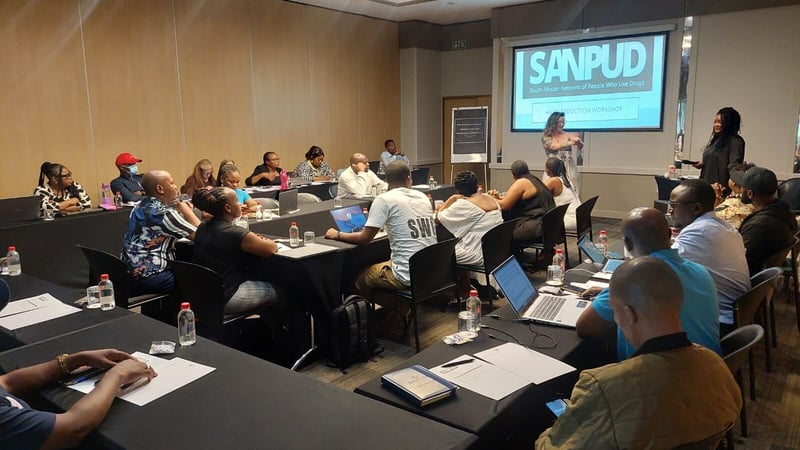Harnessing Influence - Workshops to empower stakeholders to effectively advocate for scale up of harm reduction in upcoming Global Fund country
Written by: The South African Network of People Who Use Drugs Save to Instapaper
Request for Funding Consultations Discussions
Last month, the South African Network of People Who Use Drugs (SANPUD) and the People Who Use Drugs Sub-sector worked towards upscaling the provision of harm reduction services by empowering stakeholders to better understand and eloquently advocate for its increased funding as part of the upcoming country’s Request for Funding (RFF) process set forth by the Global Fund (GF). SANPUD & PWUD sub-sectors hosted workshops in Gauteng, the Western Cape, and KwaZulu-Natal to increase stakeholder understanding and commitment towards people who use drugs, as well as a renewed sense of agency to advocate for the expansion of the People Who Use Drugs Programme in the 2025–2028 funding cycle.
The Urgency for increased investment in Harm Reduction services in South Africa
The workshops emerged against a backdrop of concerning statistics, with approximately 400,000 heroin users and 350,000 methamphetamine users in South Africa as of 2020. Notably, 82,500 individuals were reported as injecting drugs. The associated health risks are serious: HIV, hepatitis C virus (HCV), soft tissue infections, and overdoses are rampant. A staggering one in three injecting drug users is living with HIV, and half have been exposed to HCV. Research has revealed that people who inject drugs face a new HIV infection rate 17 times higher than the general population.
The prevalence of preventable diseases among people who use drugs and the success of harm reduction have prompted SANPUD and the PWUD sub-sector to push for greater support from stakeholders in the upcoming GF Request for Funding (RFF) (2025–2028) process. Research has shown a significant 60% decrease in HIV infections among injection drug users when utilising Opioid Substitution Therapy (OST). However, only 11 health districts currently offer these services out of a total of 52. It has been suggested that expanding needle and syringe coverage by 70% and OST by 97% is crucial in effectively tackling HIV & AIDS in South Africa.
Key Takeaways from our Empowerment Workshops
Each workshop aimed to empower approximately 35 individuals, preparing them for pivotal country dialogues expected to influence the RFF. The discussions underscored the definitive need for augmented harm reduction services and built a compelling case for scaling up these services in the next funding cycle, driven by shared insights and lived experiences.
Captain October, from a law enforcement background, highlighted the necessity of understanding the challenges faced by people who use drugs, particularly in the context of homelessness and survival on the streets.
“A person understands the importance of the assistance of the police and how to conduct ourselves when dealing with people who use drugs. For us to understand that the bigger need is for the harm reduction programme. I am pro from the police perspective of the harm reduction programme because it will help people that are suffering. To me, this is not just about addiction; it is a health issue.”.
From the health sector, Cristian Swarbreck suggested gathering all stakeholders for a precautionary meeting for further discussion on upscaling harm reduction services in the area.
“I am going to suggest that we get all the stakeholders together. We can call on different role players. There must be senior people that come along, the soldiers of these organisations as well.”.
A community member from Delft recounted their transformative experience at the workshop, expressing how their newfound knowledge of harm reduction was disseminated within their healthcare network.
“They made the comparison with the condom and the injection, where they would give syringes and clean needles to use so that it’s not reused, and I was amazed at the concept that is used and how far they would go in order to protect people to ensure that diseases are not transmitted because of drug users using the same needles.”.
The Harm Reduction Capacity Building Workshops stand as a testament to the power of communal knowledge exchange, capacity building, and advocacy in the quest to upscale harm reduction services through increased investment.
Get new press articles by email
A media specialist for drug policy advocacy networks that work to protect and promote the human rights of people who use drugs.
Latest from
- SANPUD Seeks Strategic Leaders to Join Peer-led Board
- How Criminalisation, Rights Erosion and Regulatory Gaps Fuel Deaths in Unregistered Rehab Centres
- Beyond Condemnation - Poverty, Alcohol and Childhood Substance Exposure in SA
- Peer-Led Action Must Be Central to South Africa’s Hepatitis Response
- Turning Airwaves into Action - Using Radio Interviews to Drive HIV Advocacy
- Nina Manzi Wellness Day taking place at the Bellhaven Harm Reduction Centre in Greyville
- SANPUD Ensures Voices of People Who Use Drugs (PWUD) Shape Drug Policy, Sustainable Funding and Research
- Funding Disruption for HIV and Harm Reduction Services Will Cost Lives So South Africa Must Rethink Our Priorities
- Empowering Nurses for Compassionate Care - Join the Online Workshop on the Pregnancy and Substance Use Toolkit
- Meaningful engagement between funders and beneficiaries charts a real path to progress
- SANPUD hosts Groundbreaking Interpol Training on GBV and Harm Reduction
- SANPUD's Advocacy for Inclusive Open Clinics Through Community-Led Monitoring
- Community-Led Monitoring Leads to Empilisweni Clinic's Inaugural PWUD Open Day
- Public Event Promoting Healthcare Services Integration at local level to increase coverage of people from marginalised populations
- The Importance of Informed Decision-Makers in Harm Reduction
The Pulse Latest Articles
- Opinion Piece: Activating Leadership To Engage The Passive Workforce (February 11, 2026)
- Tchagra Trail Wilderness Consulting Launches A New Safari Experience In Photography And Tracking (February 9, 2026)
- Magic: The Gathering Releases Lorwyn Eclipsed (February 6, 2026)
- Back To Work, Back To Balance: Rethinking The 3pm Slump (February 5, 2026)
- Back-to-school Lunchboxes That Just Make Sense (February 5, 2026)
